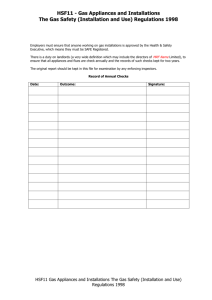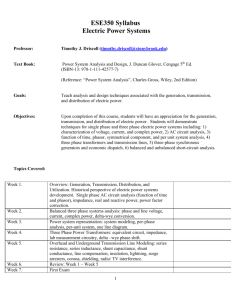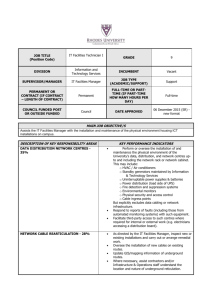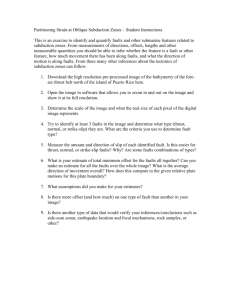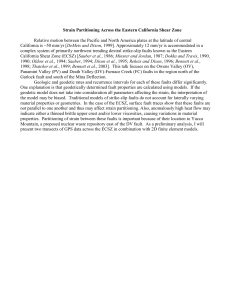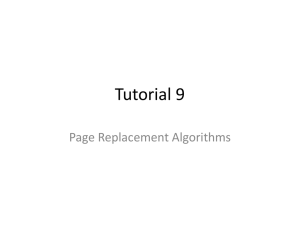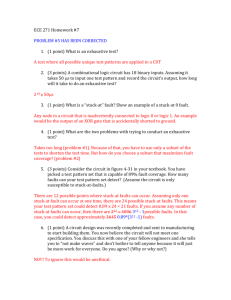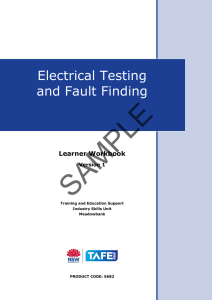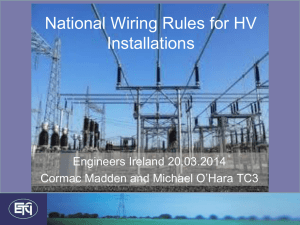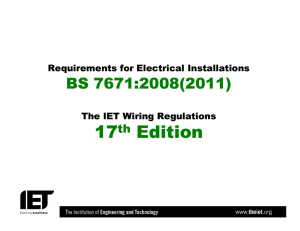City & Guilds 2395-01 - Electrical Installation
advertisement
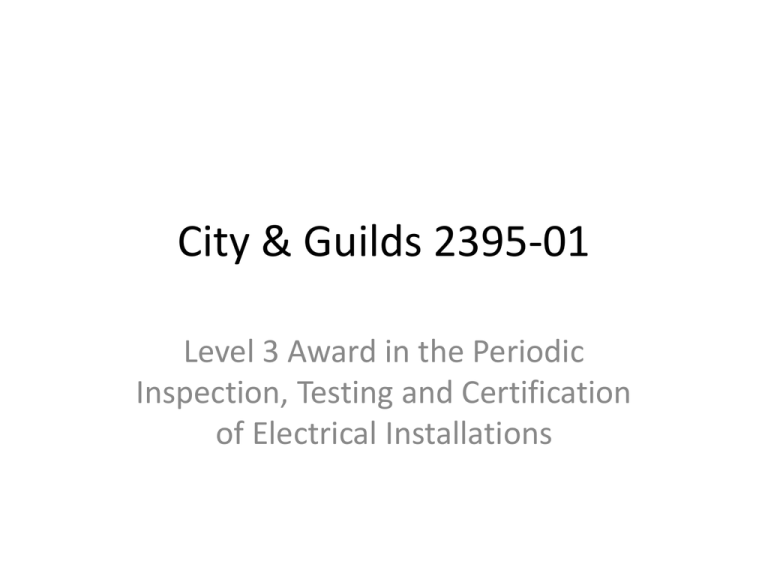
City & Guilds 2395-01 Level 3 Award in the Periodic Inspection, Testing and Certification of Electrical Installations What do you have to do? • There are three assessments to be completed in order to achieve this qualification. • 301 – On-line multiple choice test • 302 – Written Exam [Wednesday June 10th] • 303 – Practical Assessment 301 Multiple Choice Exam This exam has 40 multiple choice questions and you have 80 minutes to answer them all. This is the usual City & Guilds 2 minutes per answer. Outcome Number of questions % 1 You have to understand what is required for completing the safe isolation of electrical installations and circuits. 2 You have to understand the requirement for electrical inspection and testing of electrical installations and recording the condition thereof installations 7 18 2 5 3 Understands the requirements for the safe testing of electrical installations which havebeen placed in service 4 Understand the requirements for testingcircuits which have been placed in serviceand may require isolation 5 The requirement for testing installations that have been energised 9 22 7 18 13 22 2 5 40 100 6 Understand and interpret test results Total 302 Written Exam This is a real, written examination. It is not the same as the ones you have been doing for 2357. It will be taken under proper exam conditions and invigilated by the exam staff. Your lecturer will not be allowed into the exam room during this assessment. You are not permitted any reference material. The entire planet sits this exam on the same day, so you have to be available for Wednesday June 10th at 6pm The written exam has a duration of 90 minutes The test normally consist of up to 6 questions each counting up to 15 marks. These will be “Long answer“ questions Usually you will be given a description of an installation with the supply type, Ze, what type of cabling is installed, if there have been any alterations and various other details about the installation. From that you will be asked questions about the installation and how you would perform certain electrical tests on the installation. You can also expect some questions about the completion of the electrical installation condition report. 303 Practical Assessment The practical part of the 2395 consists of a periodic inspection and testing on an installation. You have a total of 90 minutes to do the testing and then a further 30 minutes to complete the relevant paper work. According to City and guilds you are allowed to use your BS 7671 and GN3. Despite what some people might say, you do not have to complete your testing in the sequence as you would do with initial verification. There are also 2 faults to identify out of a possible 7 that the assessor can put on the rig. This could be something like a low insulation resistance, to an open ring circuit. They are not difficult faults trying to trick you, but rather faults you should pick up if you do the tests and interpret the test results correctly. You will do an insulation resistance test on a small single phase CCU. Here you would have to identify 2 faults which would either be a short circuit, low resistance or and earth fault. This is very straight forward and should not pose a problem if you know how to work with an insulation resistance tester. You can also expect to take 2 earth fault loop impedance measurements on a simulator. You will be informed of the type and rating of the protection device after which you have to look in your BS 7671 to check if the values are acceptable or not. You need to keep in mind to apply the “rule of thumb” where you multiply the number by 0.8. The test rig is similar to that used for 2394 [2357], but as mentioned earlier will have the faults on them. This will include a 3 phase supply feeding a 3 phase DB. From that DB there will be another feed to a single phase board. There will also be some lighting circuits, an isolator with a neon, a dimmer switch, a lighting circuit with 2 way switching, a DOL starter with an isolator and socket outlet ring circuit. Normally you will start with the 3 phase board first then complete all the relevant tests and then continue to test the single phase board. There is also a visual fault recognition assessment. This used to be an installation with identifiable faults but is now a series of photographs. You will have 30 minutes where the assessor will show you 8 photos out of about a possible 20. You will then need to state what faults there are on the photos of any and state the code of the fault (C1, C2, C3) C1 - Danger present. Risk of injury. Immediate remedial action required C2 - Potentially dangerous. Urgent remedial action required. C3 - Improvement recommended.
